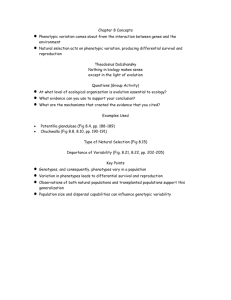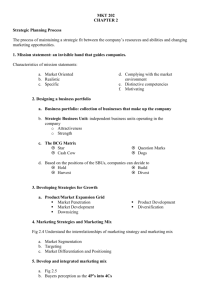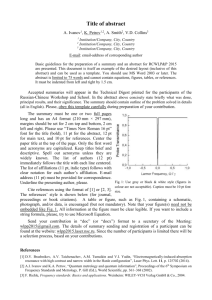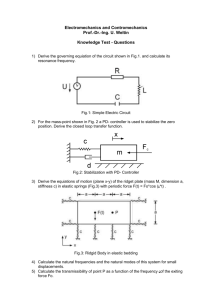1111771456_330531
advertisement
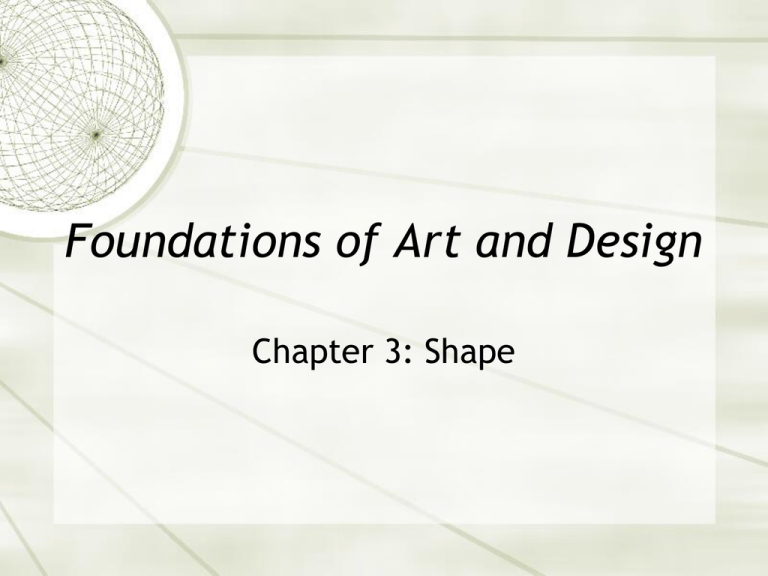
Foundations of Art and Design Chapter 3: Shape In describing this work would it be more appropriate to use the term Form or Shape? Fig. 3.1 Composition with Red, Blue, and Yellow by Piet Mondrian 50% 50% In describing this work would it be more appropriate to use the term Form or Shape? 1. Form 2. Shape 1 2 Fig. 3.1 Composition with Red, Blue, and Yellow by Piet Mondrian In the work Mondrian Variations, Construction No. 3B with four Red Squares and Two Planes by Helene Brandt the piece creates shadows on the wall. When discussing this piece what term would you be more likely to use? Fig. 3.2 Mondrian Variations, Construction No. 3B with four Red Squares and Two Planes by Helene Brandt 14% 14% 14% 14% 14% 14% 14% In the work Mondrian Variations, Construction No. 3B with four Red Squares and Two Planes by Helene Brandt the piece creates shadows on the wall. When discussing this piece would you be more likely to use the term: 1. Form 2. Shape 3. Volume 4. Form and Shape 5. Form and Volume 6. Shape and Volume Fig. 3.2 Mondrian Variations, Construction No. 3B 7. All of these choices with four Red Squares and Two Planes by Helene 1 2 3 4 5 6 7 Brandt Volume When discussing a significant work in architecture, sculpture or 3D is it more accurate to use the term Shape, Form, Volume, or all of these terms? Fig. 3.3 Schroeder House by Gerrit Rietveld 25% 25% 25% 25% When discussing a significant work in architecture, sculpture or 3D is it more accurate to use the term: 1. Shape 2. Form 3. Volume 4. All of these choices 1 2 4 Fig. 3.3 Schroeder House by3 Gerrit Rietveld The definition of mass is? Fig. 3.4 Pyramids at Giza Fig. 3.5a Louvre Museum by I.M. Pei Fig. 3.4 Pyramids at Giza 33% 33% 33% The definition of mass is: 1. 2. 3. The amount of force it would require to move an object. The bulk of an object. Both the amount of force it would require to move an object and the bulk of an object. Fig. 3.5a Louvre Museum by I.M. Pei 1 2 3 Actual Mass vs. Implied Mass In the image Landscape by Mark Tansey is actual mass or implied mass being depicted? Fig. 3.6 Landscape by Mark Tansey 25% In the image Landscape by Mark Tansey is actual mass or implied mass being depicted? 1. 2. 3. 4. 25% 25% 25% Fig. 3.6 Landscape by Mark Tansey Actual Mass Implied Mass Both Neither 1 2 3 4 Geometric Shapes In the sculpture Untitled by Vincent Fecteau are the forms mainly rectilinear or curvilinear? Fig 3.7 Untitled by Vincent Fecteau Geometric Shapes 50% 50% In the sculpture untitled by Vincent Fecteau are the forms mainly rectilinear or curvilinear? 1. Rectilinear 2. Curvilinear Fig 3.7 Untitled by Vincent Fecteau 1 2 Who started Cubism – Pablo Picasso, Braque, both of them, or neither of them? Fig. 3.11 Les Demoiselles d’Avignon by Pablo Picasso 25% 25% 25% 25% Who started Cubism? Pablo Picasso 2. Braque 3. Both 4. Neither 1. Fig. 3.11 Les Demoiselles d’Avignon by Pablo Picasso 1 2 3 4 Organic Shapes Fig. 3.13 Casa Mila by Antonio Gaudi Organic Shapes 25% 25% 25% 25% Fig. 3.13 Casa Mila by Antonio Gaudi Organic Shapes in art are shapes which: 1. 2. 3. 4. Are derived from things found in nature Suggest growth and movement Both of these Neither of these Fig. 3.13 Casa Mila by Antonio Gaudi 1 2 3 4 Abstract Shapes Fig. 3.14 Eiffel Tower in Trees by Robert Delaunay Abstract Shapes 25% 25% 25% 25% The term Abstract may refer to work which is: 1. 2. 3. 4. Nonrepresentational Nonobjective Abstracted from reality All of these choices 1 Fig. 3.14 2 Eiffel Tower 3 in Trees by Robert Delaunay 4 Nonobjective Shapes Fig. 3.16 Cubi XVIII by David Smith In Fig 3.16 Cubi XVIII by Davis Smith the work is referred to as nonobjective because: 20% 1. 2. 3. 4. 5. 20% 20% 20% 20% The work is a form of abstraction that does not begin with an object or something visible It represents nothing other than shape It has no objective Both the work is a form of abstraction that does not begin with an object or something visible; and it represents nothing other than shape None of these 1 Fig. 3 by David 4 Smith 3.162 Cubi XVIII 5 Amorphous Shapes Fig. 3.19 Before the Caves by Helen Frankenthaler Amorphous Shapes 33% 33% 33% Amorphous means? “Without shape” 2. “To change shape” 3. “More Shape” 1. Fig. 3.19 Before the Caves by Helen Frankenthaler 1 2 3 Positive and Negative Shapes Fig. 3.21 Quotation by Vitaly Komar and Aleksandr Melamid Positive and Negative Shapes 25% 25% 25% 25% In Fig. 3.21 Quotation by Vitaly Komar and Aleksandr Melamid, the main shapes are white squares. Would these squares be considered: 1. Positive shapes 2. Negative shapes 3. Both 4. Neither Fig. by Vitaly Komar 1 3.21 Quotation 2 3 and Aleksandr Melamid 4 Figure and Ground Fig. 3.24 Reclining Mother and Child by Henry Moore Figure and Ground 50% 50% When discussing sculpture the medium of the sculpture most often provides the Figure 2. Ground 1. Fig. 3.24 Reclining Mother and Child by Henry Moore 1 2 Figure Ground Reversal What is the figure of Jasper John’s image Spring? Fig. 3.27 Spring by Jasper Johns Figure Ground Reversal 20% 20% 20% 20% 20% What is the figure of Jasper John’s image Spring? 1. The man 2. The boy 3. The rain 4. All of these 5. None of these 1 3.27 Spring 2 3 4 Fig. by Jasper Johns 5 The Shaped Canvas Fig. 3.30 Portrait Series by Frank Stella The Shaped Canvas 50% Discussion Question In 1965 the Soloman R. Guggenheim Museum featured a show entitled “The Shaped Canvas.” This show challenged the notion that all paintings must be on a rectangular canvas. Do you feel that this show was influential and important to the development of modern art? 1. 2. 50% Fig. 3.30 Portrait Series by Frank Stella Yes No 1 2

